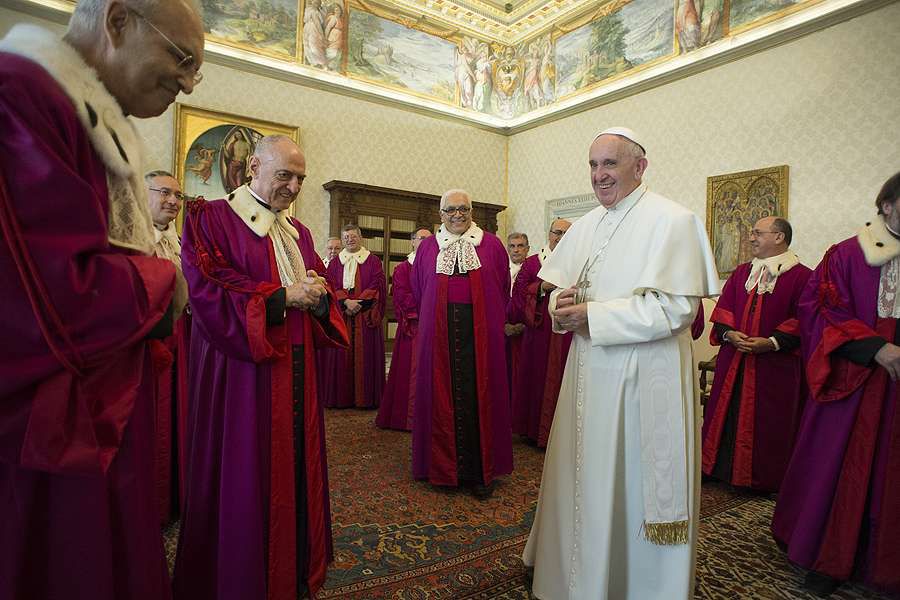Vatican City, Nov 18, 2016 / 01:12 pm (CNA/EWTN News).- On Friday Pope Francis stopped by a formation course for bishops on the new marriage nullity process, telling attendees that as bishops, and now as local judges in annulment cases, they must pursue the truth, but never exclude those whose marriages have failed.
The Church, “who is embodied in the sad stories and sufferings of the people,” bends down to the poor “and to those who are far away from the ecclesial community or consider themselves outside of it due to their marital failure,” the Pope said Nov. 18. Despite whatever distance couples who find themselves in this situation might feel, “they are and remain incorporated in Christ in virtue of their baptism,” Francis said.
He stressed that the Church has always had the attitude of a mother “who welcomes and loves, following the example of Jesus the Good Samaritan.” Because of this, it is the responsibility of bishops to never “consider them strangers to the Body of Christ, which is the Church.”
Pope Francis spoke to bishops currently in Rome to participate in a Nov. 17-19 formation course on the new, streamlined annulment process rolled out last year. He reformed the process for the causes of marriage nullity in December 2015, giving the possibility of a stronger role to local bishops, among other things.
According to the new norms, the bishop may act as a judge in cases of nullity, and can use a swifter process than is typical when nullity is “sustained by particularly evident arguments.” The reformed process was officially put into place by two documents, Mitis Iudex Dominus Iesus (The Lord Jesus, a meek judge) and Mitis et misericors Iesus (Jesus, meek and merciful), which reformed the Code of Canon Law and the Code of Canons of the Eastern Churches, respectively.
In addition to the increased role open to the local bishop, the reform also dropped the requirement of an automatic appeal when one tribunal found a marriage to be null, and ensured that the process would be free of charge. It also established that each diocese must have its own tribunal.
Pope Francis' reforms were intended to simply and streamline the process, while also safeguarding the indissolubility of marriage. His visit to the Rota for the course fell nearly one year after the new process went into effect Dec. 8, 2015, coinciding with the feast of the Immaculate Conception and the launch of the Jubilee of Mercy.
The Roman Rota is one of three tribunals in the Roman Curia, and is the court of higher instance, usually at the appellate stage, with the purpose of safeguarding rights within the Church. In his speech to course participants, Pope Francis said that bishops, while having been made “teachers of the faith” through their consecration, must also “continually learn.” To learn in this sense, he said, “is to understand the needs and questions of humanity today and to look for answers in the Word of God and in the truth of the faith.”
He pointed to Bl. Paul VI’s 1975 apostolic exhortation Evangelii nuntiandi, in which the late Roman Pontiff encouraged evangelization efforts to take place “not in a superficial way,” but by “descending into the concrete situations of people.” “Attention to people is the underlying theological and ecclesial motive for this formation course,” the Pope said, adding that spiritual health and “the salus animarum (salvation of souls)” of the persons entrusted to them “is the end of every pastoral action.”
The mission of a bishop, he said, is ultimately expressed in the First Letter of Saint Peter, in which the apostle encourages pastors at the time to tend to their flock not because they are forced to, “but willingly, as would God,” and to do so with “a generous heart” while providing an example for the flock. “In this perspective, it is necessary to decisively eliminate every impediment of a worldly nature which makes it difficult for a large number of faithful to access ecclesiastical tribunals,” he said, stressing that economic or organizational problems “cannot be an obstacle to the canonical verification of the validity of marriage.”
Francis then spoke of the “healthy relationship” between justice and charity, explaining that Church law can’t ignore “the fundamental principle of salus animarum.” Because of this, ecclesiastical tribunals “are called to be a tangible expression of a diaconal service of the laws in regard to this primary end,” he said, noting that the salvation of souls indicates “the horizon of mercy.”
Pope Francis noted that the questions the bishops bring from their own dioceses and experience of marriage pastoral ministry “require answers and actions that are not always easy.” However, he voiced his confidence that the course would help them to find “the most appropriate approach to the various problems,” and thanked the Dean of the Rota, Msgr. Pio Vito Pinto, as well as the other speakers, who included Cardinal Christoph Schonborn of Vienna, for their “competent legal, theological, and pastoral contribution.”
Pope Francis closed his speech by encouraging the bishops to return to their dioceses “enriched with notions and useful tips in order to perform your ministry more effectively, especially regarding the new marriage process.” This process, he said, is “an important help” in terms of to growing their flocks in imitation of Christ the Good Shepherd, “from whom we must daily learn the wise search of the unum necessarium (one thing necessary): the salvation of souls.”
He prayed that the Holy Spirit, who “invisibly but truly guides the Church,” would help both them “and also the Successor of Peter to respond with availability and humility to the cry of help of so many of our brothers and sisters who need to discover the truth of their marriage and their ways of life.”

